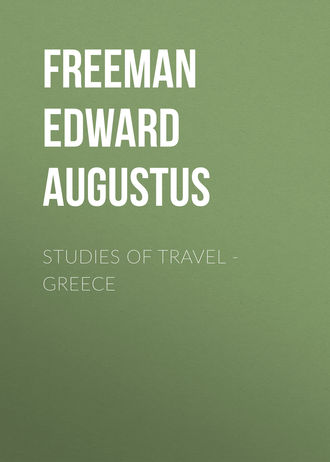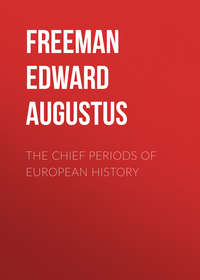 полная версия
полная версияStudies of Travel - Greece
Corinth
Thus far on our Hellenic journey we have been able to contrast cities which were swept away for ever in days which we call ancient with cities which have kept on an uninterrupted being to our own day. The city of the two seas, the city which guards the Isthmus, the city beside whose hill-fortresses all rival hill-fortresses seem as molehills, has a history which is unlike either, a history which, among the great cities of Greece, is wholly her own. And, as none of the great cities of Greece has seen such ups and downs of fortune as Corinth, so none has won for itself a more varied fame. There is no Greek city whose name has entered into more familiar sayings; it even sank to be a kind of a byword in very modern times. Holding, never a first, but always a high secondary place, alike in Grecian legend and in the most brilliant times of Grecian history, Corinth came to be the centre of all Grecian history in the days of the second birth of Grecian freedom; it was swept from the earth by Roman vengeance as none other of the great Grecian cities ever was; it arose afresh as a Roman colony, again under the influence of sky and soil to change into a Greek city; it kept on its Greek character through the ages of Slavonic invasion, to become one of the points most fiercely struggled for in the warfare of Turk and Venetian, to be taken and retaken by the patriots and the oppressors of yet later warfare. And now, after so long and so busy a life, after the endurance of so many blows at the hand of man, the last blow has been dealt by the hand of nature. The last of many earthquakes has sealed the doom of Corinth yet more effectually than it was sealed when Mummius swept it with the besom of destruction. Mummius simply destroyed, and what Mummius destroyed Cæsar could restore. But the last overthrow of Corinth has given her a neighbour and a rival. Old Corinth is forsaken; New Corinth has sprung up by the shore. New Corinth may well grow, and she may have ages of prosperity in store for her. But while New Corinth grows and flourishes by the shore, the only chance for Old Corinth at the foot of the mountain is that New Corinth may grow to such a degree as some day to annex the venerable site as one of its suburbs.
Those who believe in Semitic or other foreign settlements in Greece are apt, though they have no legend like those of Pelops or Kekrops to help them, to quarter a Phœnician settlement on Akrokorinthos. A name or two is all that they have to show, and a hill called φοινίκαιον, and an Ἀθήνη Φοινίκη do not prove much. No site can be more thoroughly Greek; the hill-top, near the sea, but not on it, is the ideal position for a Greek coast town of the earliest type; and at Corinth we have the mightiest of hilltops, near but not on, not one sea only, but two. It is the central point of Hellas, looking all ways, commanding her coasts and her mountains on every side. Its earliest name of Ephyrê is one scattered over many sites of central and northern Greece, from Argolis and Sikyonia to Thessaly and Thesprotia. Semitic elements may have mingled with the local worship of Aphroditê without supporting any Semitic occupation. Corinth traded with all the world, and she may have learned many things from Phœnician visitors without Phœnician settlers ever occupying her soil. The most Hellenic in its position of all Hellenic cities cannot be given up to the barbarian. Instead of a Phœnician origin, the votaries of the East must be satisfied with the most striking of Phœnician analogies. If Corinth and Carthage were not sisters in origin, they were at least sisters in destiny. They perished together, and they rose again together, if the foundation of the Roman colony can be called a rising again of either the Greek or the Phœnician city.
The old memories of far-distant Poseidônia come again on the mind — not unfittingly in a place where Poseidôn was so highly honoured — when we look on the one surviving building of the lower city. Old Corinth is now a mere village of a few houses. A few memorials of Roman times are there; but, as at Poseidônia, they have to be looked for. The one ancient building which strikes the eye and gives a character to the place is the shattered temple, where seven columns still stand in all the stern majesty of the earliest and severest Doric. Corinth gives her name to the latest, the richest, the most graceful form of architecture of Greece. But her one surviving relic is, of all buildings on old Hellenic soil, the one which is furthest removed from the character of her own order. The birthplace, so men deemed, of painting, one of the chosen seats of sculpture, a city crowded with splendid temples of later date, has now nothing to show but these half-fallen columns, carrying us back to the earliest days of the historical being of the city. Young as they seem beside the gates and vanished columns of Mykênê, the Parthenôn is young beside them. They carry us back to the days of Bacchiads and Kypselids, the days when Corinth was the mistress of the Western seas, and sent forth her colonists and artists to follow on the peninsular of Korkyra the models which she had reared at the foot of her own guardian mountain.
The columns stand over the modern village, over a site almost as desolate as that over which they must have stood in the hundred years between Mummius and Cæsar. The other fragments, Greek and Roman, hardly come into the view. But the lower city is not the true Corinth. It is the mountain citadel round which the great associations of the city gather. As we look on from far, as we climb up its steep sides, we think of the two great moments of its deliverance, the day
When first Timoleon’s brother bled,and the night when Aratos, in his earlier and nobler days, climbed up that steep in the teeth of Macedonian guards and baying dogs, and made Corinth once more a free Hellenic city. We picture him the next morning in the agorê, leaning wearied on his spear, and telling to the citizens whom he had delivered the tale of the night’s work which had set them free. And with such a scene before us, we are not tempted to dwell on the darker day when the deliverer undid his own work, when, rather than divide the possession of Peloponnêsos with a Spartan rival, he could give back the mount of Corinth to a Macedonian lord. High indeed the mount soars above the city, as high above the Larissa of Argos as the Larissa of Argos soars above the little hill of Tiryns. Stern and bare it rises above the city; stern and bare it rises above the open land on either side. But where the mountain sinks more gently towards the lesser height on its Sikyonian side, we may climb the winding path; we may enter the gateway of the forsaken fortress; and here indeed we find the history of Corinth, the history of Hellas, written legibly in stone. The fortress which, but fifty-five years back, was so fiercely disputed between the men of the land and their barbarian masters is now a fortress only in name. The warder keeps the gate; but he keeps it only as a form. The walls shelter only ruins. But they are ruins which tell their tale, fragments which tell how
Many a vanish’d year and age, And tempest’s breath, and battle’s rage, Have swept o’er Corinth.Every age, from the earliest to the latest, has left its living and speaking memorials on that memorable hill, and no classical barbarian has yet taken in hand the cruel work of wiping out that long and wondrous history. Here, in the very gateway, is a primæval wall, reared, it may well be, before Corinth was Dorian, a wall of stones such as Corinth’s own Sisyphos might have been set to roll up the mountainside. Hard by is an arch of the thirteenth century of our era, an arch, not of Venetian, but of genuine French work, work of the days when there were Latin Princes of Achaia and Latin Emperors of the New Rome. We pass on among the fortifications, the dwellings, the temples, of all the creeds and races which Corinth has seen as citizens or as masters. Here is work of Hellenic days, of days when Corinth sent forth her colonies on her one sea and met the Persian in arms on the other. Here are traces of the temples of the Roman colony, traces of the Corinth where Paul taught and which Alaric entered as the first armed disciple of Paul’s teaching. Here is the Byzantine church, witness of the long years when Corinth stood as an outpost of Christendom, in one age against the heathen Slave, in another against the Mahometan Turk. Here is the Turkish mosque, the Turkish dwelling, telling of the long struggle when the Turk wrested the fortress from the Greek, when the Venetian wrested it back from the Turk, when the Turk wrested it once more from the Venetian, till the happier day when the fetter of Hellas, the horn of Peloponnêsos, again passed into the hands of her sons. All are in ruins, all are fittingly in ruins, seeing that all are memorials of powers which have passed away. But as ruins let them be guarded and revered, as ruins which tell their tale, the tale of Corinthian and Hellenic history. The blind fury of the destroyer has decreed that the history of Athens shall no longer be read on the akropolis of Athens. Let Corinth harbour no such enemies. Let not a wall be touched, let not a stone be swept away, which still lives to tell how many times and by how many hands
Was Corinth lost and won.The ascent is long; to any but the young and active or else the practised mountaineer it is toilsome. But the toil is broken by the relics on which we stop to gaze on our path; it is repaid by the mighty landscapes on which we gaze. It is not too much to say that we look on Hellas from its centre. The small ruined church on the height brings Akrokorinthos within the company of the sacred hills of Christendom, the hills where a sanctuary on the height looks down on town or city at its feet. Cashel has been seized by another hand as a parallel to the akropolis of Athens; a miniature more like the model is found in our own island, where the Tor of Glastonbury looks down on the battle-fields of Western England. Nearer in size however, in the mountain fittings of the landscape, are the twin hills of Sitten. But the giant alps which fence in the Rhone valley of themselves hinder the varied prospect of mountain and plain and sea and island which meets us from the hill of Corinth. The lowlier English height really comes nearer, both in effect and in historic sentiment, to the central citadel of Hellas. If the Sugarloaf, as we prosaically call it — the Pen-y-val of its own people — which so proudly guards the entrance to the Usk valley, had the castle and church of Abergavenny on its summit instead of at its foot, we should have a nearer approach than all to Akrokorinthos, though it would be Akrokorinthos without its seas. But without the seas there could be no Corinth, there could be no Hellas. The point where the Eastern and Western seas most nearly touch is in truth the centre, the key-stone as the poet puts it, of the whole peninsular land south of Olympos. From the citadel of Corinth, if all Hellas does not itself lie within our sight, yet all Hellas lies within sight, as it were, by representation. Peloponnêsos and Attica, the land north and south of the gulf, the shores of the two great confederacies, the mountains of Arkadia and of Phôkis, and the snowy head of Aitolian Korax, stand there as if to speak of the lands north and south of them. And if the Western islands, once the special scene of Corinthian enterprise and Corinthian dominion, are beyond our sight, we may pass on to them in thought along the gulf over which the triremes of Corinth were rowed to their first sea-fight with revolted Korkyra. The eastern sea opens to the right, and the curved shore of Salamis speaks of the nobler warfare where Corinth joined with Athens and with Aigina to beat back the invading lord of Asia. At some favourable moment the eye may even catch the pillared steep of the akropolis of Athens, that Athens which Corinth once hoped to see turned into a sheep-walk, but whose help she was so soon to crave against the very Sparta which held back her destroying hand. From that height the Isthmus seems but a flat plain between the two seas — the Isthmus so often fortified, so often stormed by successive invaders. By that narrow neck Agêsilaos and Antigonos, Mummius and Alaric, James of Avesnes and Francesco Morosini, Amurath and Mahomet and Ali Koumourgi have all made their way into the peninsula. But in all that long history there are two days, not far apart in so long a tale, which stand out conspicuously above all. There is the day of the Roman deliverer and the day of the Roman destroyer, the day of Flamininus and the day of Mummius. Not that it was the freedom of Greece which Flamininus proclaimed in the agorê of Corinth; such a proclamation would have been an insult to the allies of Rome and to all those Greek states which in name at least kept their freedom then and for ages after. But he proclaimed the freedom of Corinth, the freedom of all the Greek lands which the last Philip held in bondage. Fifty years later Corinth was swept from the earth; but let no man deem that even then Achaia became a Roman province. Corinth fell, Corinth rose again, to live a longer and a more varied life as the foundation of Cæsar than as the foundation of Alêtês. And those seven aged columns have stood and looked on all these changes; they beheld the reign of Periandros; they have lived to behold the reign of George of Denmark.
The Akrokorinthos is a mountain covered with ruins; the lower city has sunk to a small village. A few houses are all that remain of that busy meeting-place of two worlds; the shattered temple alone speaks of the creeds that are fallen; one mean church and another small chapel are all that are there to tell of the church which an Apostle founded. Yet the single priest of Corinth and his small flock may boast themselves that they have two epistles of the New Testament all their own, a privilege of which those few Christian households may seem more worthy than the mixed multitude of the modern Thessalonians. A night may be spent in Corinth, and that unharmed by the enemies on whom the comic poet of Athens has so grotesquely bestowed the Corinthian name. There is no fear of the δήμαρχος ἐκ τῶν στρωμάτων — no fear that the traveller may have to cry ἐξείρπουσιν οἱ Κορίνθιοι. But in Greece all animals seem to send forth louder and clearer notes than in other parts of the world; and in Corinth, the centre of Greece, they seem, though it may be merely fancy, to be louder and shriller than in the rest of Greece. A poet more recent than he whom we have so often quoted has sung of
The deep grey of the morning, when Bulgarian cocks are shrill.Of the vocal powers of Bulgarian cocks we can say nothing; but there must just now be many witnesses either to confirm or to correct the poet’s description. But in the solitude of modern Corinth the few voices that are heard, whether of man or beast or fowl, seem certainly to sound louder and shriller even than in Athens itself. Aphroditê had one of her special homes in Corinth, though the seven massive columns are said to belong, as surely they ought to belong, to her greater sister Athênê. But the bird who once played Aphroditê so sorry a trick, and the beast which carried Dionysos and Zanthias on their journey to the lower world, call us betimes, with a power of voice which surely no Bulgarian cock could surpass, to make our way, not to Kenchreaï, but to its modern substitute Kalamaki — thence once more to draw near to Athens, this time by way of the shore of Megara and of her own Salamis.
The Corinthian Gulf
Corinth, we have said, with its mountain citadel, is truly the central point of Greece. But we do not thoroughly feel how the Isthmus parts asunder two different spheres of Greek life and history till we find ourselves on the gulf which takes its name from the city on the Isthmus. We can, if we will, make our way to Athens first of all by way of the gulf; but we shall perhaps better understand the position in Grecian history which is held by the shores of the gulf, if we take them at a later stage of our journey. It may, in short, be well to leave Greece by the Corinthian gulf, to make it our way back again to the western islands from whence we started. It is impossible to study Greece in strict chronological order, unless we could anyhow drop from the clouds on the akropolis of Mykênê. But by taking the Corinthian gulf and its shores late in our course, we shall be enabled to end our survey with those parts of Greece which, at least in the days of her old independence, were the last to come to the front. And by this course we shall perhaps better understand why those parts came to the front later than others.
Greece, the most eastern of the three great peninsulas of Europe, begins to play its part in the history of the world earlier than the peninsulas of Italy and Spain; and in the like sort, it is the eastern side of Greece which begins to play its part in the history of Greece earlier than the western side. Is it answered that the position of Athens, the most eastern part of the Greek continent, as a leading state in Greece, is of comparatively late date? As far as dominion goes, Mykênê, Argos, Sparta, all came to the front before her. But it was Athens which, in some unrecorded age, made the first advance in Greek and in European political life by that union which made one commonwealth — we might say, one city — of Athens and Eleusis, of Marathôn and Sounion. Here was in truth the beginning of political history, the foundation of a state of such happy dimensions as to become the model of city-commonwealths for all time. And as for the cities which came before Athens in dominion, they too lie, if not so far east as Athens, yet on the eastern side of their own peninsula. All the earliest greatness, the earliest history, of Greece gathers round her Ægæan, not round her western, shores. Her colonies go eastward and northward, covering all the eastern coast with an Hellenic fringe, while far distant Kymê was the single outpost in the west. Down at least to Macedonian times the eastern side of Greece keeps its predominance; the western side is important mainly as the road to a distinct Hellenic world in Italy and Sicily. Ever and anon this distinct western world influences the eastern Hellenic world, sometimes, as in the great Athenian overthrow before Syracuse, with terrible effect. But, on the whole, the western side of Greece, the side where Corinth was greater than either Sparta or Athens, remained secondary in Grecian affairs, while the Greek world still further to the west lived a life of its own, broken only by occasional dealings with the states of the older Hellenic land. Politically the older Greek world looks in the main eastward. It is only the great religious centres of the nation which in any sort cast their eyes towards the islands of the blessed. Dôdônê lies to the west, in a land whose Hellenic character was called in question. So does Olympia within Peloponnêsos itself, while Delphoi, if it does not look absolutely westward, if its connexion with Thermopylai binds it in some sort to the eastern side of Greece, still looks directly on that central gulf which forms the great highway to the western shores. At Corinth indeed the rule is reversed; the city of the two seas and the two havens looks far more to her western than to her eastern outlet; but her great Isthmian sanctuary looks to the Saronic and not to the Corinthian gulf. The names are well chosen. The western gulf was the true gulf of Corinth. No other city of equal rank stood on its shore, while its waters formed the highway to the insular and quasi-insular dominion of Corinth on the western seas, to Leukas and Korkyra and long-lived Epidamnos, to Ambrakia, fated to be the capital of Pyrrhos, to mightier and more distant Syracuse, fated to be the capital of whole dynasties of tyrants and kings.
We at last then bid farewell to Athens and Attica; and, in bidding farewell to Athens and Attica, we bid farewell to something more. We pass from one Hellenic world to another. We once more cross the head of the Saronic gulf to Kalamaki; thence carriages bear us, it may be to New Corinth, it may be to Loutraki to the north of it, according to exigencies of which the landsman is a poor judge. In either case we are carried far more distinctly away from one geographical and historical region to another than when we simply cross from one side of the Saronic gulf to another. As we are borne over the Isthmian hills, we look to Peloponnêsos on one side, to Northern Greece on the other; we look forward on the Corinthian gulf, and we are borne along to all that it suggests in the further West. On the East we have turned our backs; and we feel that we have done something more than turn our backs in the way which the physical necessities of travel compel us to do. We begin to understand that the northern, the southern, and the western view really make up a system in which the lands and seas which we leave behind us have no share. And when we once find ourselves on the waters of the Corinthian gulf, we begin to feel ourselves in another world from the world of the eastern Hellas, the world of Athens and Sparta. In both of the great divisions of the inland sea, within and without the straits, in the gulf of Krissa and in the gulf of Patrai, we feel that we have left the Greece of Herodotus, Thucydides, and Xenophôn behind us. We are in a world which their history touches only by fits and starts; we have sailed into the Greece of Polybios. We have made our way from the world of city-commonwealths into the world of federations; as we pass along, the lands of the two great Leagues lie on either side of us. Through nearly the whole of our journey we skirt the Achaian shore to the south, and what, in later times at least, became the Aitôlian shore to the north of us. Lesser Leagues, Boiôtia — for in those later times Boiôtia must count among lesser Leagues — Phôkis, and Lokris, fill up whatever space Aitôlia left unannexed. And, when we have cleared the gulf and are fairly in the western sea, we draw near to another federal land on the shores of Akarnania. We may even cast, if not our eyes, at least our thoughts, to the great northern mainland which in those days had become both Hellenic and federal as the Confederation of Epeiros. Here then is a world where we go by many spots which call up both earlier and later associations, but where the main interest as distinctly belongs to the second and third centuries before our æra as the main interest of the lands washed by the Ægæan belongs to the fourth, fifth, and sixth centuries before our æra.
We should be the last to shut out either the earlier or the later associations. We do not forget that Aitôlia, poor in early history, is rich in yet earlier legend, or that it reached the height of its legendary fame when the divine Epeians gave way to the Aitôlian colony which was to grow into the Eleian guardians of Olympia, the special servants of Zeus. As we skirt the inner bay of Krissa, we may think of all the sacred wars from Solôn to Aischinês. Naupaktos has its place alike in legend and in history; in the waters of the outer gulf we remember alike Phormiôn of Athens and Don John of Austria. As we pass by Patras, we remember how well St. Andrew fought for his city against Slave and Saracen. As we look on the southern shore, we remember that there were once Frank Princes of Achaia no less than Frank Dukes of Athens. As we look to the northern shore, we remember that there was a day when the Empire of Servia stretched, without a break, from the Danube to the Corinthian gulf. And, beyond all this, as we skirt the northern shore of the outer gulf, we pass by a spot whose fame in later times outshines every other association from Meleagros to Don John. We pass by Mesolongi, the city of the two immortal sieges, of the long defence where the Fanariot Mavrokordatos, alone among his class, placed his name alongside of the men of Souli and the men of Hydra — of the night of the great sally which places the name of Mesolongi alongside of Ithomê and Eira, of Saguntum, of Numantea, and of Zaragoza. All these memories go to make up the history of the shores along which we pass; still they lie outside its main and special interest. They come either before or after the days when the two shores of the gulf formed the main centre of Hellenic history. The Achaian cities line the shore, and, with our usual protest against vain attempts to call back a past which is gone for ever, for a moment we hardly regret that Slavonic Vostizza has again become Hellenic Aigion. But before we reach the older Achaian shore, we pass by the territory of the city but for whose help those Achaian cities, whose place in earlier history is so small, could never have risen to become one of the two leading powers of Greece. There is the land of Sikyôn, city of Aratos, deliverer and betrayer of Corinth to the right — the man who taught the cities to the left the art of Themistoklês, the art which teaches how a small state may become a great one. And we see plainly written on the two shores, why, in the warfare of those times, the League of the North was commonly the aggressor, the League of the South was commonly the victim. Save here and there some more favoured spot, the shore of Aitôlia seems bare beyond the common bareness of Grecian hills; the shore of Achaia seems rich with a richness the like of which we have hardly seen on any other part of the Hellenic mainland. The narrow strait, the strait by which Phormiôn won his glory, brings into that close neighbourhood which is so characteristic of Greek geography — a neighbourhood as near as that of Euboia to Boiôtia at one point and to Northern Achaia at another — two races as unlike one another as any could be who worshipped the same ancestral gods and spoke dialects of the same ancestral tongue. The development and the rivalry of those two powers give us our second lesson in Grecian history, the lesson of the days when, if the scale of men is smaller, the scale of things is larger, when cities have grown into federations, when the range of Grecian politics is no longer shut up within the Grecian seas, but when Macedonia and Pergamos, Syria and Egypt, Carthage and Rome herself, have begun to appear as actors on the scene. The seas of Eastern Greece belong to the days of her more brilliant yet narrower fame, when Greece was her own world, when the teachings of her history are mainly teachings of example and analogy. The seas of Central and Western Greece belong to the days when Greece, less free it may be, less brilliant, less rich in great deeds and mighty men, had become part of a greater world, and when her destinies had become connected with the destinies of later days by a direct chain of cause and effect. The historical position of the Corinthian gulf is that it is, above all the waters of Hellas, the sea which washes the shores of the Federal lands.







